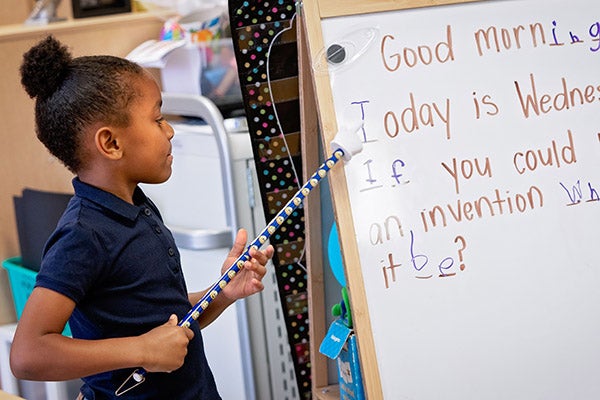ECU Community School raises academic performance grade
When the K-12 school performance grades for the 2021-22 academic year were released from the N.C. Department of Public Instruction, the East Carolina University Community School had a reason to celebrate.
“When the Community School first opened in 2017-18, none of our children were proficient,” ECU Community School Principal Tracy Cole said. “They grew, but they did not pass the state test. We had a 0% proficiency rate and that was one of the lowest scores in the state.”
The school’s proficiency score rose to 6% in 2018-19, then to 13% in 2020-21 before it reached the current proficiency score of 43%. The performance grades released in September were the first since 2019. Performance reporting requirements were waived the past two years due to the pandemic.

The East Carolina University Community School improved its performance score from 0% proficiency in 2017-18 to 43% this past year. (Photo by Cliff Hollis)
Performance grades for third through eighth grade are based on end-of-grade (EOG) test scores in reading and math, as well as science for fifth and eighth grades. The state has a formula that calculates whether a student has made the expected growth over the academic year, in addition to seeing how children are performing according to state grade-level standards.
“When you look at the data across the state, most school districts’ scores moved backwards during the pandemic,” Cole said. “But at the Community School, our scores have had a forward progress and have not moved back. That is a testament to all of the hard work that the adults on this campus — our teachers, teacher assistants, reading specialists, special education teachers, social workers, counselors, the whole school family — have put in to continue the teaching and learning process for our children.”
With their increased proficiency scores, the Community School raised its performance grade from an F rating to a D.
“It is a big deal, because it’s showing that more of our children are meeting the state standards and they’re passing their tests,” Cole said. “We have also shown that we are continuing to grow our students. While some of the students may not pass the test, they are at a different point than when they first started.”
Due to its increased performance, the school also was removed from the comprehensive support and improvement list, which comprises the schools that make up the lowest performing 5% in the state.
“The excellent instruction from our teachers and leadership from our principal at the ECU Community School positively impact the academic achievement of our scholars,” said Dr. Art Rouse, College of Education interim dean. “The teachers and principal continue to leverage resources to provide our scholars quality experiences that support their intellectual, social and emotional development. We are grateful for the partnerships with the ECU community, Pitt County Schools, and the Pitt County community.”
One of the areas that saw a marked improvement was reading and literacy. Reading education faculty partnered with the Community School during the 2021-22 academic year to provide literacy support.
“The literacy studies program here in the College of Education values this partnership, which centers literacy teaching and learning for all stakeholders,” said Dr. Elizabeth Swaggerty, interim chair of the Department of Literacy Studies, English Education and History Education. “Research tells us that key influences on student reading achievement include the socioeconomics of communities, schools and homes; and teacher expertise and autonomy.”
Dr. Kimberly Anderson, literacy studies associate professor, served as ECU visiting faculty for the school. In that role, she supported teachers in literacy instruction, participated in hiring literacy specialists and developed a reading intervention/support program.
“Dr. Kimberly Anderson’s expertise in early literacy, literacy intervention and literacy coaching has been a perfect match for the school’s needs,” Swaggerty said. “Her leadership in facilitating teacher professional development, after-school tutoring, and book distribution programs has potential to continue the positive trajectory of student achievement.”
Donors’ generosity also helped provide needed materials for students. The Lookout Foundation fund supported the purchase of children’s books to send home with students over holiday break and enabled 100 students to participate in the Kids Read Now summer book distribution program.
“Book donations from the United Way funded primary grades books, and the Lookout Foundation funded books for intermediate grades,” Swaggerty said. “Book selections included high-interest, high quality texts that had representation of diverse identities and cultures.”
Cole acknowledged how important these donations were to the students’ success as well as the importance of volunteers from AmeriCorps and teacher education students from the College of Education.
“At the Community School, we are committed to continued work so that we move from that D to a C and then from that C to a B,” Cole said. “We’re going to keep pushing, but we realize that it’s a process because we are still a relatively young school.”